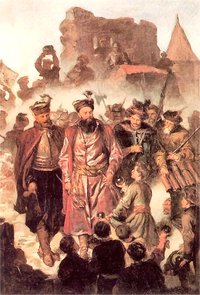Siege of Kraków (1655)
| Siege of Kraków | |||||||
|---|---|---|---|---|---|---|---|
| Part of the Second Northern War and The Deluge | |||||||
 Stefan Czarniecki defending Kraków in 1655 |
|||||||
|
|||||||
| Belligerents | |||||||
|
|
|
||||||
| Commanders and leaders | |||||||
|
Charles X Gustav of Sweden Arvid Wittenberg |
Stefan Czarniecki | ||||||
| Strength | |||||||
| 13,000-14,000 few dozen cannons |
2,200 soldiers 2,300 militia 160 cannons |
||||||
The siege of Kraków was one of the battles during the Swedish invasion of Polish–Lithuanian Commonwealth (Second Northern War / Deluge). It started on 25 September 1655 and ended on 13 October 1655. Capitulation treatment was signed 4 days later. Polish troops marched out the city on 19 October. The city's defense was led by Kiev's castellan Stefan Czarniecki, while Swedish forces were commanded by king Charles Gustav and Arvid Wittenberg.
On August 2, 1655, when news of Swedish victories reached the city, the mayor of Kraków, Andrzej Cieniowicz, urged residents to organize defence of the ancient Polish capital. He also collected taxes for employment of 1,000-strong infantry unit. The garrison of Kraków was ordered to watch the city walls and control foreigners, especially Germans, who resided in the city. Furthermore, works on the fortifications were initiated under city engineer Izydor Affaita, and Krzysztof Mieroszewski of the local nobility. To cover the cost of the works, queen Marie Louise Gonzaga handed over some of her jewelry.
On August 27, Bishop of Kraków Piotr Gembicki urged residents to pledge allegiance to the king and to defend the city. The bishop paid for 300 soldiers, who strengthened the garrison, while city council created armed militia, which consisted of students and other residents.
On September 19, King Jan Kazimierz came to Kraków, after the lost Battle of Zarnowiec. The king brought a few thousand soldiers and levée en masse, but the morale of his army was low. Several members of the nobility abandoned the king, while the army, concentrated at Pradnik, organized itself into a confederation, demanding money and renouncing Hetman, Stanislaw Lanckoronski. On September 20, the Council of the Senate had a meeting, in which allegiance to the king was confirmed. Soon after the meeting, the queen, together with Primate Andrzej Leszczyński left the city.
...
Wikipedia
